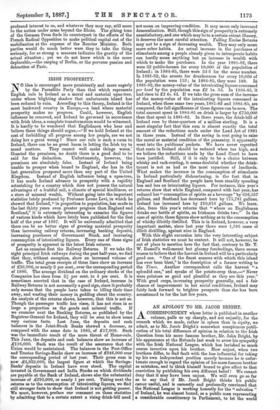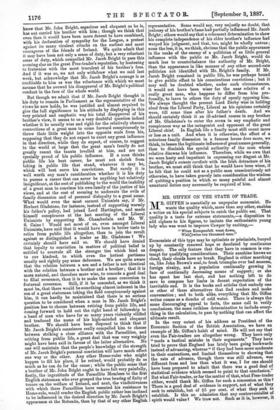AN APOLOGY TO MR. JACOB BRIGHT.
ACORRESPONDENT whose letter is published in another column, pulls us up sharply, and not unjustly, for the remark which we made, rather in spleen than in equity, we admit, as to Mr. Jacob Bright's somewhat conspicuous publi- cation of his total difference of opinion in relation to the Irish Question from his more famous brother, Mr. John Bright, by his appearance at the Rotunda last week to avow his sympathy with the Irish National League, which has lavished so much coarse invective upon his brother. How unjust, when two brothers differ, to find fault with the less influential for taking up his own independent position merely because he is unfor- innate enough to regard the opinion of his more famous brother as mistaken, and to think himself bound to give effect to that conviction by publishing his own different belief I We cannot deny that it may have been unjust. We will even go so far as to say that if Mr. Jacob Bright thinks his public career useful, and is earnestly and profoundly convinced that the National League is working honestly for the " salvation " of Ireland, he was almost bound, as a public man representing a considerable constituency in Parliament, to let the world
know that Mr. John Bright, sagacious and eloquent as he is, has not carried his brother with him ; though we think that even then it would have been more decent to have combined, with his declaration of sympathy for the League, a protest against its many virulent attacks on the earliest and most courageous of the friends of Ireland. We quite admit that it may have been not only a sense of duty, but a very reluctant sense of duty, which compelled Mr. Jacob Bright to pass this seeming slur on the great Free-trader's reputation, by hastening to fraternise with the most truculent of his brother's foes. And if it was so, we not only withdraw what we said last week, but acknowledge that Mr. Jacob Bright's courage is as creditable to him as was the reluctance with which we must assume that he avowed his disapproval of Mr. Bright's political conduct in the face of the whole world.
But though we admit that if Mr. Jacob Bright thought it his duty to remain in Parliament as the representative of the
views he now holds, he was justified and almost required to give the full significance to his attitude by displaying in this very pointed and emphatic way his total disapproval of his brother's view, it seems to us a very doubtful question indeed whether it be usually wise and right for the relatively obscure connections of a great man to come forward conspicuously to throw their little weight into the opposite scale from his, supposing that they do not expect to exert any great influence in that direction, while they do expect, of course, to suggest to the world at large that the great man's family do not greatly resent the taunts levelled at him, and are not specially proud of his public influence. If a man thinks public life his best career, he must not shrink from taking in public life that stand, whatever it may be, which will best serve his convictions. But surely it is well worth any man's consideration whether it is his duty to pursue a career that can never be anything but relatively insignificant, at the cost of publishing to the world the inability of a great man to convince his own family of the justice of his views, and at the cost of seeming to underrate the evils of -family dissension and of personal disloyalty to a great name. What would even the most earnest Unionists Bay, if Mr. Herbert Gladstone, for instance, instead of supporting warmly his father's policy, had joined Lord Hartington, and made 'himself conspicuous at the last meeting of the Liberal Unionists by supporting Mr. Chamberlain and Mr. W. S. Caine ? Would not most of us, even amongst Liberal Unionists, have said that it would have been in better taste to retire from public life altogether, than to join the revolt against so distinguished a leader as Mr. Gladstone? We certainly should have said so. We should have denied that loyalty to conviction in matters of political belief is entitled to overrule all the stronger ties which bind us to our kindred, to which even the hottest partisans usually and rightly pay some deference. We are quite aware that the relation between a son and a father is not identical with the relation between a brother and a brother ; that it is more natural, and therefore more wise, to concede a good deal to filial reverence, than it is to make the same concession to fraternal reverence. Still, if it be conceded, as we think it must be, that there would be something almost indecent in the son of a great statesman taking the field conspicuously against him, it can hardly be maintained that there is no serious question to be considered when a man in Mr. Jacob Bright's position has to choose between retiring from public life, and coming forward to hold out the right hand of fellowship to a band of men who have for so many years violently vilified and traduced the name of his high-minded and eloquent brother. We should have been disposed to think that if Mr. Jacob Bright's conscience really compelled him to choose between striking a close alliance with the Parnellites, and retiring from public life, a great deal that was very weighty might have been said in favour of the latter alternative. No one will maintain that the people's knowledge of the strength of Mr. Jacob Bright's personal conviction will have much effect one way or the other. Any other Home-ruler who might happen to fill his place, if he retired, would probably do as much as he can do for the cause ; while the public sense that a brother of Mr. John Bright ought to have felt very painfully, firstly, the ingratitude of the Parnellite Members to the first English statesman who ever grasped the true bearing of fixity of tenure on the welfare of Ireland, and next, the vindictiveness with which these Parnellites have resented his resistance to Home-rule, would render the English public rather less inclined to be influenced in the desired direction by Mr. Jacob Bright's appearance at the Rotunda, than by that of any other English representative. Some would say, very unjustly no doubt, that jealousy of his brother's fame had partially influenced Mr. Jacob Bright ; others would say that a vehement determination to show his complete independence of his elder brother's influence had warped his judgment, and that, too, might be wholly untrue ; none the less, it is, we think, obvious that the public appearance in the ranks of the enemy of a politician of so little general influence with the public as Mr. Jacob Bright, would do much less to counterbalance the authority of Mr. Bright, than the appearance in like manner of any other second-rate politician not identified with Mr. Bright's family. If Mr. Jacob Bright remained in public life, he was perhaps bound to give public effect to his conscientious convictions ; but it may well be doubted whether, under such circumstances, it would not have been wiser for the near relative of a really great man, who happens to differ from him pro- foundly, to leave to others the duty of openly opposing him. We always thought the present Lord Derby wise in holding aloof from the Liberal Party, Liberal as his opinions certainly were, till some time after his father's death. And we should certainly think it an ill-advised coarse in any brother of Mr. Gladstone's to enter the arena in any emphatic and conspicuous way as the antagonist and opponent of the great Liberal chief. In English life a family must still count more or less as a unit. And when it is otherwise, the effect of a notorious family dissension in a famous house does more, we think, to lessen the legitimate influence of great names generally, than to diminish the special authority of the man whose relative disowns his influence. Therefore, while we own that we were hasty and impatient in expressing our disgust at Mr. Jacob Bright's entente cordiale with the Irish detractors of his brother, we must still think that he would have been wiser, if he felt that he could not as a public man conscientiously act otherwise, to have taken gravely into consideration the wisdom of quitting a position in which so many painful and almost unnatural duties may necessarily be required of him.



































 Previous page
Previous page